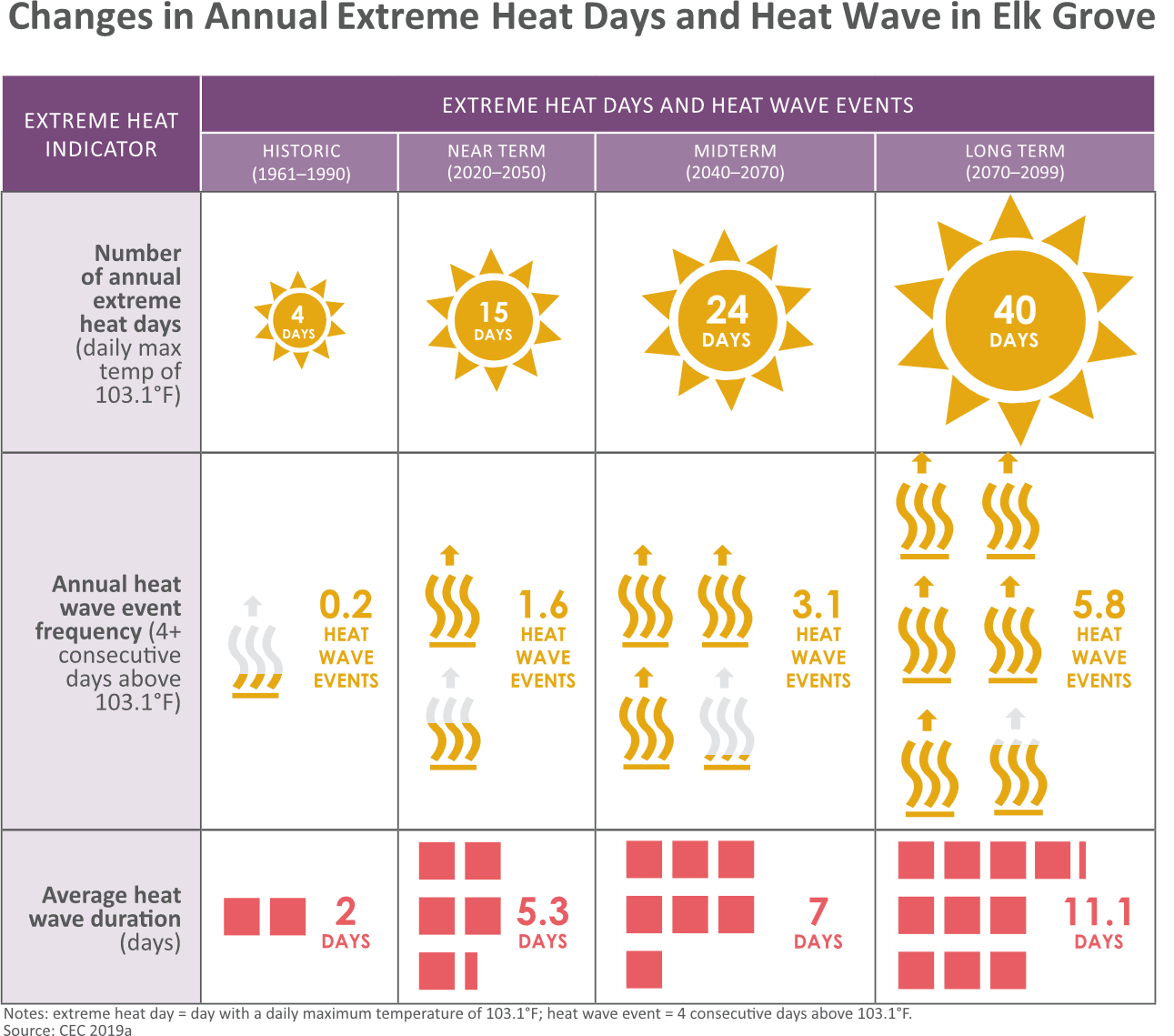City of Elk Grove Community Mobility Resilience Plan
SB 1 Adaptation Planning Grant: Final Case Study
Brief Summary
The City of Elk Grove (City) created the Community Mobility Resilience Plan (Plan) with the goal of developing detailed actions, funding strategies and partnerships to respond and adapt to the local impacts of climate change on the transportation system and the Elk Grove community more broadly. The plan focuses on three primary climate-related impacts that the City has identified as high priorities:
- increased frequency and severity of flooding events,
- increases in extreme heat and heat wave events, and
- the fiscal impact to the City from declining vehicle-related sales tax revenue (i.e., vehicle sales and fuel sales) due to expected changes in transportation behavior including adoption of electric vehicles and declining vehicle ownership due to ride-hailing services and autonomous vehicle technologies.
Key deliverables for the project included three white papers on the three project focus areas, including impact-specific vulnerability assessments; the Community Mobility Resilience Plan document including a comprehensive set of adaptation strategies; and an online StoryMap to provide an interactive website for residents to engage in plan implementation.
Lead Agency and Partnerships
The City served as the lead agency on this project with support from various City departments as well as regional stakeholders and community organizations.
Drivers
Development of the Plan was funded by the SB 1 Caltrans Adaptation Planning Grant Program. The planning process was not driven by any one piece of legislation or mandate but was developed as a forward-thinking effort to proactively address several specific climate vulnerabilities for the City. The Plan also takes a proactive approach in addressing shifts in transportation behavior including adoption of electric vehicles and VMT reduction goals. These trends have been reaffirmed by State policies including Governor Gavin Newsom’s signing of Executive Order N-79-20, requiring 100 percent of the new passenger cars and trucks sold in California to be zero-emission vehicles by 2035, as well as the State’s piloting of VMT tax programs to eventually replace the State gas tax as electric vehicles become more prevalent and fuel sales taxes decrease.
Engagement Process
To gain input from the Elk Grove community and keep the residents informed, the City conducted a series of outreach events during Plan development. Outreach activities included:
- Hosting a preliminary public workshop in February 2020 to introduce the planning process and vulnerability assessment findings,
- Distributing an online survey to gain input on a preliminary set of resilience strategies,
- Coordinating a set of stakeholder meetings to gain feedback on the draft plan, and
- Publishing an online StoryMap website including key plan highlights and engagement opportunities for residents.
As part of the Implementation Framework for the Plan, the City is currently establishing a Community Resilience Task Force (Task Force) to help increase the City’s capacity and knowledge base for implementing the Plan.
Climate Impact Area
Based on community input, Working Group feedback, and the findings from the white papers, a set of resilience strategies were developed. Resilience strategy categories focused on climate impacts include:
- A Resilient Roadway Network and Stormwater Management System
- A Resilient Transportation System
- A Resilient Built Environment
- A Climate-ready Community
- Social and Economic Resilience
Resilience strategy categories focused on the City’s fiscal health include:
- A Forward-looking Transportation System
- A Resilient and Diversified Tax Base
The individual strategies in each category include a description and strategy metrics including the specific climate impact being addressed, the implementation mechanism to be used, desired timing of strategy implementation, City department responsibilities for each strategy, and the resources used to develop the strategy to help staff better prepare for implementation. Where appropriate, strategies from other relevant planning documents such as the City’s CAP and General Plan were included to prioritize integration of planning processes and avoid duplication of efforts.
Funding Source
The Project was funded by SB1 Caltrans Adaptation Planning Grant. The total cost of the project was $337,688.
Research and Data
The Plan was developed using guidance from the original 2012 California Adaptation Planning Guide (APG); the 2020 update to the APG; and the Federal Highway Administration’s Vulnerability Assessment and Adaptation Framework, which provides guidance on assessing the climate vulnerabilities of the transportation system. To conduct the climate-specific vulnerability assessments for the Plan and develop resilience strategies, as comprehensive set of tools and resources were used including:
- Cal-Adapt
- California Heat Assessment Tool (CHAT)
- California Healthy Places Index
- Environmental Protection Agency EJSCREEN: Environmental Justice Screening and Mapping Tool
Challenges
The COVID-19 pandemic created challenges for effectively engaging with and gaining feedback from the public. As a solution, the project team pivoted towards using more online engagement tools to conduct outreach events. The use of the online StoryMap tool helped in creating interesting and interactive ways for residents to engage at a distance.
Outcomes
In February 2021, the Elk Grove City Council adopted the Community Mobility Resilience Plan, the City’s first stand-alone adaptation planning document. As part of the Implementation Framework included in the Plan, implementation cost estimates were conducted for each of the 33 resilience strategies included in the Plan, helping the City in financial planning and prioritization for strategy implementation.
Replicability
The use of impact-specific (e.g., extreme heat, flooding) vulnerability assessments is a novel process that can be translated to other communities, with an understanding that traditional vulnerability assessments, which often analyze all climate-related hazards (e.g., flooding, extreme heat, wildfire), often do not provide the level of detail needed to fully assess impacts and develop effective strategies. Additionally, the use of strategy cost-estimates included in the plan serves as a replicable model for other communities.
Additional Resources
Community Mobility Resilience Plan Website
Further Information
For more information on the Plan and its implementation, please contact Carrie Whitlock, the City of Elk Grove’s Strategic Planning & Innovation Program Manager at cwhitlock@elkgrovecity.org.

